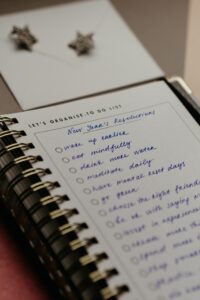29 Dec How can I break a bad habit and keep a good one?
Are you making a New Years’ resolution this year? Have you made them in the past only to find that after a short time you weren’t able to stick with it? What makes us stick to a new habit and get rid of the one we want so badly to break?
When we make a big change in our life – even if it is a really positive change, the body goes into a fight, flight, or freeze mode as a reaction to a big change and a pull to keep the status quo. So if you haven’t run at all for instance and you decide you want to run your first 5K, a big change would be saying to yourself “I’m going to get out there and run a mile every day this week!” This would be too drastic of a change. If you implement a “micro” change, however, you’ll have a better chance of sticking with it and it will also help you build momentum. So forget the quick gratification of making a big change because it’s less likely you’ll stick with it.
Charles Duhigg in his excellent book The Power of Habit says that there isn’t one particular formula for changing habits “It’s not that formulas don’t exist. The problem is that there isn’t one formula for changing habits. There are thousands”. He does offer a 4 step framework for changing habits and it is as follows:
1. Identify the routine: Have an understanding of what your “bad” habit is. What are the cues that cause you to pick up the cigarette for instance and what is the reward that you get for doing so?
2. Experiment with rewards: If every day at a certain time of day you “reward” yourself with a cookie for example you’ll want to change that in some way. Perhaps you wait an hour before you have the cookie and see if you can get an idea of what you are craving and why. “Rewards are powerful because they satisfy cravings. But we’re often not conscious of the cravings that drive our behaviors”.
3. Isolate the Cue: Identify the cues that cause you to reach for the cookie at a certain time. “Experiments have shown that almost all habitual cues fit into one of five categories: 1. Location 2. Time 3. Emotional State 4. Other People, 5. Immediately preceding Action.
4. Have a Plan: Duhigg asserts “Take, for instance, my cookie-in-the-afternoon habit. By using this framework, I learned that my cue was roughly 3:30 in the afternoon. I knew that my routine was to go to the cafeteria, buy a cookie, and chat with friends. And, through experimentation, I had learned that it wasn’t really the cookie I craved – rather, it was a moment of distraction and the opportunity to socialize. So I wrote a plan: At 3:30, every day, I will walk to a friend’s desk and talk for 10 minutes.

